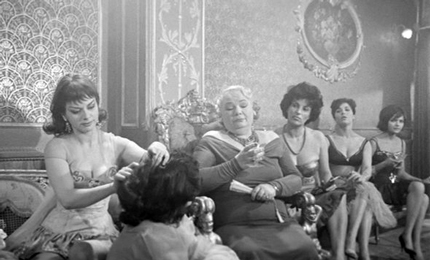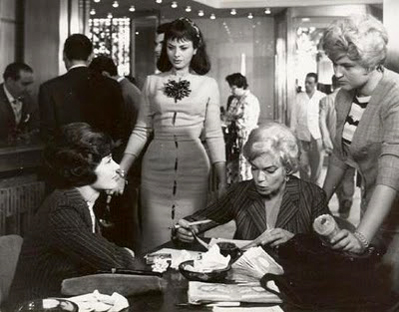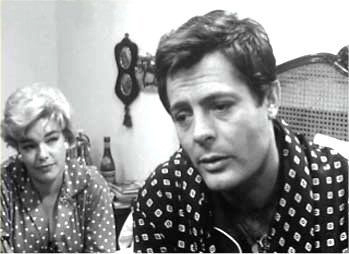
 |
|
|
|
From 1960, the top year of the Italian cinematic Renaissance comes Antonio Pietrangeli's Adua and Her Friends (Adua e le compagne), a compassionate drama about a provocative subject, prostitution. The same year's Never on Sunday became an international success story but Adua has a more hard-edged take on human nature and social hypocrisy. Top names Simone Signoret, Sandra Milo, Emmanuelle Riva and Marcello Mastroianni are in fine form. For its release in the United States Pietrangeli's movie was cut by half an hour and given the misleading, exploitative title Love a la Carte. 
U.S. distributors surely felt that Adua and Her Friends was too sordid for general distribution. It's 1959, and Italy's new Merlin Law seeks to abolish prostitution by closing the country's previously licensed brothels. All the edict actually accomplishes is to drive the women out into the streets. Adua Giovannetti (Simone Signoret) and three of her ambitious (and rather uninhibited) friends elect to rent a house outside of Rome, open a trattoria country restaurant, and make big money by quietly taking men upstairs. Although the Merlin Law decrees that former prostitutes be given a clean slate, the women are refused a business license. The local fixer Doctor Ercoli (Claudio Gora) has apparently arranged the legal roadblock for his own benefit. He secures their needed license but buys the building; the deal is that as soon as the trattoria is established, the women will resume their previous profession and pay him an exorbitant monthly fee. Adua and Co. have no choice but to comply. The restaurant gets off to a bumpy start, as the new partners are not accustomed to rising in the morning, let alone doing work. But each sees the possibilities of a new life. Caterina, called Milly (Gina Rovere of Big Deal on Madonna Street) is surprised to find herself courted by an eligible young bachelor. The foolish Lolita (Sandra Milo) enjoys the new camaraderie with her friends. The emotionally fragile Marilina (Emmanuelle Riva) at first rebels, but then sees hope in their new work and brings her little boy to live in the house. Adua, the toughest and the most experienced, becomes emotionally invested in Piero (Marcello Mastroianni), a ladies' man that she should know will bring her no good. All goes well until Doctor Ercoli reappears, demanding that the women return to their old line of work, immediately. Adua and Her Friends is a warm and emotionally involving entertainment aimed directly at society's double standard. It gives us four very distinct and well-drawn female characters, women trapped in a strictly defined and demeaning role. Adua and her friends discover that the second part of the Legge Merlin will not be honored, leaving them as permanent social misfits. Their profession was once legal, but now the only alternative to walking the streets is to submit to the will of the male underworld. Adua is the first to see this, and protests being "branded like cattle". The shy Milly finds a man who wants her despite her background. He's willing to accept her if they can forget the past, but the publication of her photograph makes the union impossible. 
Adua's star cast is matched by its writing and directing talent. Antonio Pietrangeli directed second units for Luchino Visconti and co-wrote scripts with Fellini and Rossellini. His co-writers Tullio Pinelli and Ettore Scola wrote some of the biggest Italian films of the 1960s and '70s. The film won as the best Italian film of the year and also took home a Silver Lion at the Venice Film festival. From the first image of an old woman on the street at night, we know that Adua has something special to say. Pietrangeli's camera roams through the houses of prostitution on the final evening before closing, capturing beautiful images while listening to the girls' saucy jokes. They are happy that they'll no longer have to climb the steep stairs to the upper floors. Things are different out in the country, where the prostitutes face ordinary working life for the first time. Wearing plain dresses instead of nightgowns, they clean and decorate the house and make a mess of their first cooking sessions. Marilina drinks too much and Lolita complains, while Milly does the heavy lifting. Adua finds herself the only really responsible member of the funny, bickering group. But they come to enjoy their new freedom as owners of their own business. As Adua remarks, running a restaurant is a respected trade -- one that a woman can continue to do when she is no longer young. 
The little trattoria becomes a real home, with memories. A local priest is a daily visitor. The pop celebrity Domenico Modugno is a customer one afternoon, and even sings a song (Piú Sola). The sun and the space bring out forgotten aspects of the partners' personalities. Marilina enjoys being a mother and Milly is impressed that her boyfriend likes her cooking and treats her with respect. It isn't long before the idea of receiving men as sex customers becomes undesirable. Even the tough-minded Adua suddenly feels self-conscious and shy when sleeping with her boyfriend Piero. The happy times culminate in one ideal party day when Marilina's son is baptized. All is bright and everything seems possible. Adua and Her Friends plays out at a relaxed tempo that adds to its feeling of life being lived in real time. The four friends clash in amusing ways but remain distinct, sympathetic personalities. Each grows in awareness and becomes more comfortable with her own sentimentality. Milly seems the least imaginative but is actually the most resilient of the four. Lolita remains unable to make decisions for herself. Director Pietrangeli communicates these delicate distinctions in marvelously insightful scenes. Running to Piero for help, Adua shudders at the sight of an ugly, weary streetwalker, fearful that the woman represents her own future. The fragile Marilina returns drunk and desperate to her former bordello, finding a few minutes' peace in what were once secure surroundings. Lying on the bed, she stares happily at the cracks in the ceiling that she knows so well. Rarovideo's DVD of Adua and Her Friends is a flawless enhanced transfer of this beautifully filmed B&W show. The clear soundtrack makes use of various Spanish standards as well as the odd source cue -- Santo and Johnny's 1959 steel guitar instrumental single Sleep Walk comes as a complete surprise. Piero Piccioni's original music cues go well with images of Adua smoking as she searches for a way to get clear of her problems. 
Film historian Maurizio Poro introduces the film, lauding director Pietrangeli's understanding of women. Poro tells us that the filming was noted for a clash of personalities. Sandra Milo was the producer's girlfriend and reportedly tried to use the relationship to tailor scenes to her benefit. French actress Simone Signoret had just won an Oscar for Room at the Top. But she was said to be in a rocky emotional state, as press rumors had linked her husband Yves Montand romantically with Marilyn Monroe while working on Let's Make Love. Co-star Emmanuelle Riva was basking in her own accolades, after her starring role in the previous year's art house success Hiroshima, mon amour. Also included is the Antonio Pietrangeli-directed segment Girandola 1910 from the 1954 color bedroom farce Amori de mezzo secolo. A filmography and biography are on the disc menu and repeated in an insert booklet along with an essay by Bruno Di Marino. Rarovideo's presentation is in Italian with removable English subtitles.
On a scale of Excellent, Good, Fair, and Poor,
Adua and Her Friends rates:
Reviews on the Savant main site have additional credits information and are often updated and annotated with reader input and graphics. Also, don't forget the 2010 Savant Wish List. T'was Ever Thus.
Review Staff | About DVD Talk | Newsletter Subscribe | Join DVD Talk Forum |
| ||||||||||||||||||